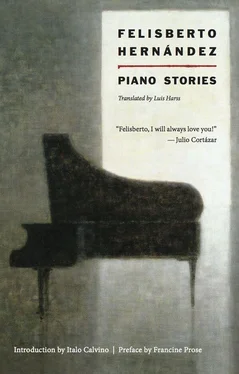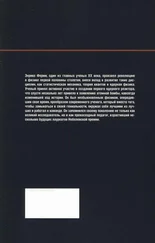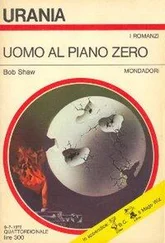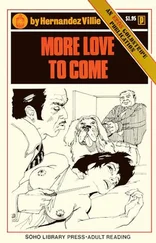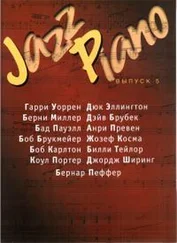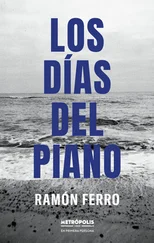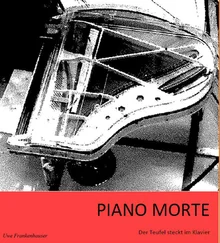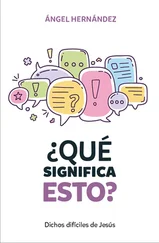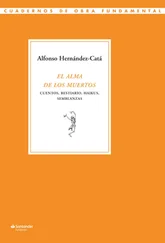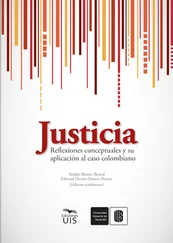Felisberto Hernandez - Piano Stories
Здесь есть возможность читать онлайн «Felisberto Hernandez - Piano Stories» весь текст электронной книги совершенно бесплатно (целиком полную версию без сокращений). В некоторых случаях можно слушать аудио, скачать через торрент в формате fb2 и присутствует краткое содержание. Год выпуска: 2014, Издательство: New Directions, Жанр: Современная проза, на английском языке. Описание произведения, (предисловие) а так же отзывы посетителей доступны на портале библиотеки ЛибКат.
- Название:Piano Stories
- Автор:
- Издательство:New Directions
- Жанр:
- Год:2014
- ISBN:нет данных
- Рейтинг книги:4 / 5. Голосов: 1
-
Избранное:Добавить в избранное
- Отзывы:
-
Ваша оценка:
- 80
- 1
- 2
- 3
- 4
- 5
Piano Stories: краткое содержание, описание и аннотация
Предлагаем к чтению аннотацию, описание, краткое содержание или предисловие (зависит от того, что написал сам автор книги «Piano Stories»). Если вы не нашли необходимую информацию о книге — напишите в комментариях, мы постараемся отыскать её.
Piano Stories
Piano Stories — читать онлайн бесплатно полную книгу (весь текст) целиком
Ниже представлен текст книги, разбитый по страницам. Система сохранения места последней прочитанной страницы, позволяет с удобством читать онлайн бесплатно книгу «Piano Stories», без необходимости каждый раз заново искать на чём Вы остановились. Поставьте закладку, и сможете в любой момент перейти на страницу, на которой закончили чтение.
Интервал:
Закладка:
It was not morning yet. Things were clearing up in me a little before daylight. I had decided to start writing. Then my partner reappeared: he had also survived, thrown out on another part of the beach. Somehow I’d known he would be back the moment I sat down to write my memories.
At first he had made himself felt in the usual way, as a presence, not physically there but threatening to walk in off the street disguised as some ordinary person from the world of everyday reality. Because, until that morning, I had been in one place and the world in another. Between the world and me there was a layer of dense air. On very clear days I could see the world through that air and also hear the noises in the street and the murmur people make when they talk. My partner was the representative of the people living in the world. But he was not always an enemy who had come to steal my memories and speculate with them. Sometimes he appeared almost in the guise of a mother warning me of a danger and awakening my instinct for self-preservation. At other times he scolded me for not going out into the world — and then, as if he were my mother scolding me, I lowered my eyes and didn’t see him — or he could appear as a friend advising me to write down my memories and appealing to my vanity. I felt closest to him when he evoked the presence of dear friends whose wise advice had helped me with my writing in the past. Sometimes I would even feel him put a hand on my shoulder. But at other times I didn’t want his advice or his presence in any of its forms. That was when I was sick with my memories, especially in the stage of the sickness when I was watching the specters of remorse in their dramatic performance and trying to glimpse my fate in the relations between different memories from different times. If I had touched lonely depths of suffering with my remorse, afterward I felt entitled to a more or less extended period of relief: suffering was the best food to appease the beasts of remorse. And my greatest pleasure was searching through different memories to see whether they shared any secret and whether their different events all expressed a similar sense of being. Then I would rediscover a forgotten childish curiosity in myself, as if I were returning to a house in a corner of the woods where I had once lived, surrounded by people whose furniture I was now going through, uncovering secrets I hadn’t suspected at the time, although everyone else may have known them. This was the task at which I most wanted to be left alone, because my partner would make so much noise coming in that he would scare off the silence that had settled on the objects in the house. Besides, my partner was a city man with city ideas: he would take many of the objects back to the city with him, changing their lives to make them serve those ideas; he would dust them off and dress them up in a new coat of paint, and they would lose their soul. But my greatest fear was for the things he would suppress, coldly wiping out their secrets until they had been stripped of all imprecision, like a dream emptied of everything that makes it fantastic and absurd.
That was when I ran from my partner — like a thief, deep into the woods, to be alone with my memories. When I thought there was no one near I would start going over the objects, trying to breathe an air of bygone days on them to bring them back to life. Then, having run all the way into the back of my mind, I had to push myself forward again. I wanted to make new sap flow through plants, roots, and tissues probably long dead or disintegrated. And the fingers of the mind delving down into itself not only found the old roots but discovered new connections, felt their way along new mosses branching out in new directions. But as the fingers sank through the waters in which the tips of the roots were submerged, it turned out they weren’t sensitive enough to perceive endings so subtle that they melted into the water, and the fingers lost their way. Finally, the fingers broke off from the mind that was guiding them and continued the search on their own. I had no idea what old connections there might be between the delving fingers and the lost roots — whether the roots, back in those days of the past, might not have arranged to grow the fingers capable one day of the twists and turns along devious paths with which they were now feeling their way back to them. I couldn’t think about this for long because I heard footsteps: probably my partner hiding in a tree, or behind it. Again I fled as if I were plunging deeper into the center of myself, shrinking from sight like a microbe contracting under a lens. But I knew I would never get away from my partner, who would soon be spinning around me, also changed into a microscopic body and drawn toward my center.
And while my partner kept circling me I also knew what he was thinking and how he was responding to my thoughts and actions: I could almost say my ideas attracted his like echoes. At times his ideas invaded me with such irresistible force that I thought of him as an enemy as inexorable as fate. The force of these ideas was also that of the world and its habits, which made me sad in so many ways. Yet that morning I felt at peace with my partner. I had my own lot of sad habits, and although they might not agree with those of the world, I had to try to combine the two. Because I wanted to be let into the world I decided to adjust to it and allow some of my affection to spill out over everything and everybody. Then I discovered that my partner was the world — it was useless to try to shake him off. I had received my daily bread and my words from him. Besides, when he was representing only one person at a time — not the whole world as now — while I wrote down my memories of Celina, he had been a tireless companion who had helped me turn my memories, including those burdened with remorse, into writing — and that had been a great relief to me. So I can forgive him for smiling when I refused to enclose my memories in a grid of space and time. And I can forgive him for tapping his foot impatiently over my scrupulous insistence on unraveling the tissue of memory down to the last thread, until its last wisps melted into the water and the last breath of movement was nowhere in space and left the air undisturbed.
On the other hand, I have to thank him for the times he followed me at night to the edge of a river where I went to see the water of memory flow. When I drew some water in a jug and was saddened at how little and how still it was, he would help me invent other containers for it and comfort me by showing me its different shapes in the different vessels. Afterward we invented a boat in which to cross the river to the island where Celina’s house was. We would take along thoughts that fought hand to hand with our memories, knocking over or displacing many objects in the house. Some of the objects may have rolled under the furniture, and others we must have lost on our way back, because when we opened the bag with our hoard it was always down to just a few bones, and the small lantern we had been holding over the soil of memory dropped from our hands.
Yet the next morning we always turned what little we had gathered during the night into writing.
But I know the lamp Celina lit on those nights is not the same one that now lights up in memory. An immensity of time larger than the world separates her and the things lit up around her from me, blinding them to me. Caught in the air of that other time of theirs, under another sky, they have lost their memory, which is why they can’t remember me. But I remember them all and have lived with them and breathed them in the air of many different times, roads, and cities. Now, with my memories hidden in the dark air of the night and only that lamp on, I realize once again that they don’t recognize me and that their affection has become not only distant but oblivious of me. Celina and the other inhabitants of her room look at me sideways, or, when facing me, stare straight through me, as if there were someone behind me or I had never been in the room with them. Their looks are like the looks of mad people who have long forgotten the world. They are specters that don’t belong to me. Could it be that Celina and her lamp and chairs and piano are angry at me because I never went back to that house? Yet it seems to me that the child I was took them with him when he left and they are all still living together somewhere, and that must be what they are remembering. Now I’m someone else and when I want to remember the child I can’t: I don’t know what he looks like from where I am now. Something of him is still in me and I have kept many of the objects that were in his eyes, but his way of seeing and being seen by the “inhabitants” of the room is lost to me.
Читать дальшеИнтервал:
Закладка:
Похожие книги на «Piano Stories»
Представляем Вашему вниманию похожие книги на «Piano Stories» списком для выбора. Мы отобрали схожую по названию и смыслу литературу в надежде предоставить читателям больше вариантов отыскать новые, интересные, ещё непрочитанные произведения.
Обсуждение, отзывы о книге «Piano Stories» и просто собственные мнения читателей. Оставьте ваши комментарии, напишите, что Вы думаете о произведении, его смысле или главных героях. Укажите что конкретно понравилось, а что нет, и почему Вы так считаете.
